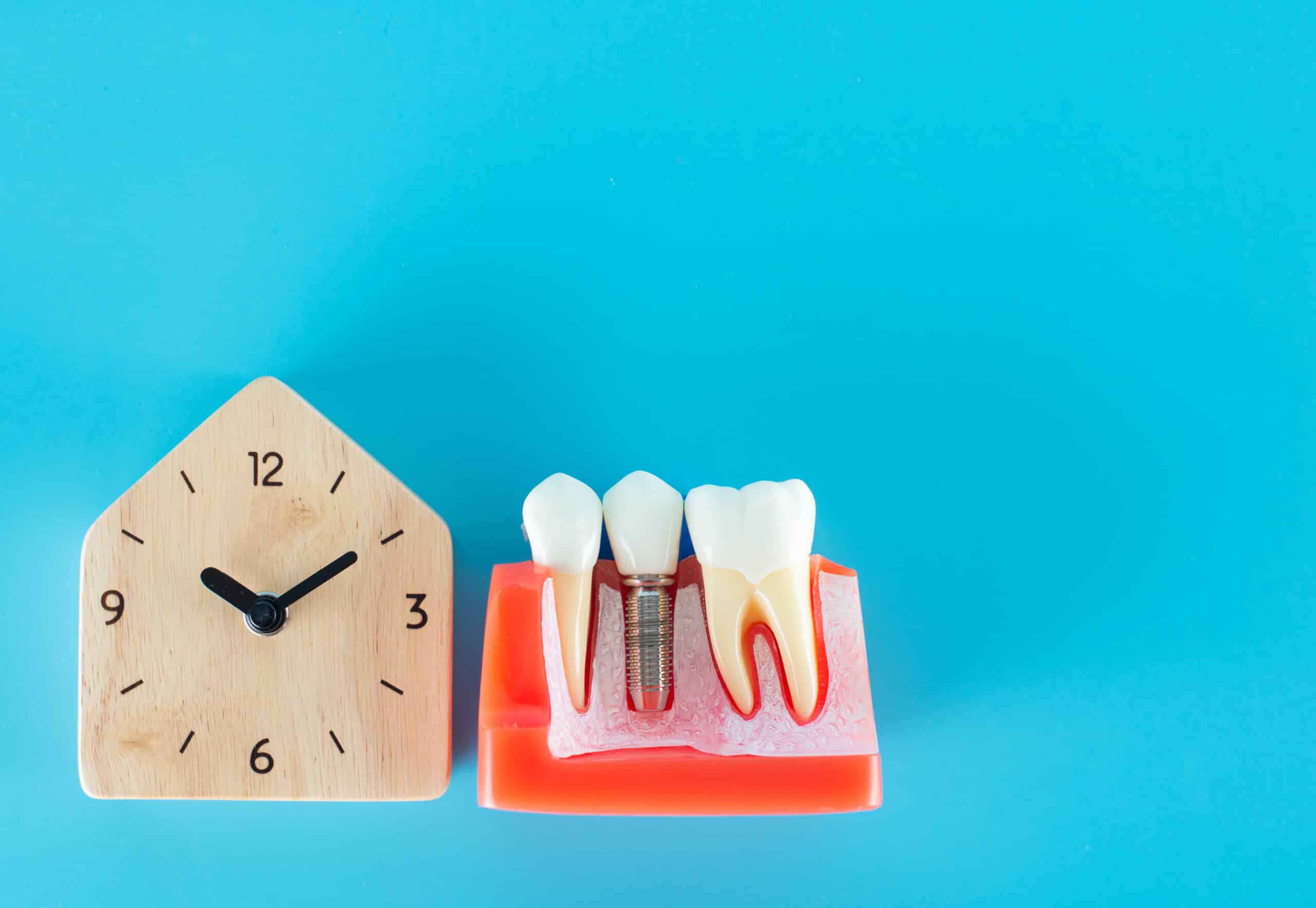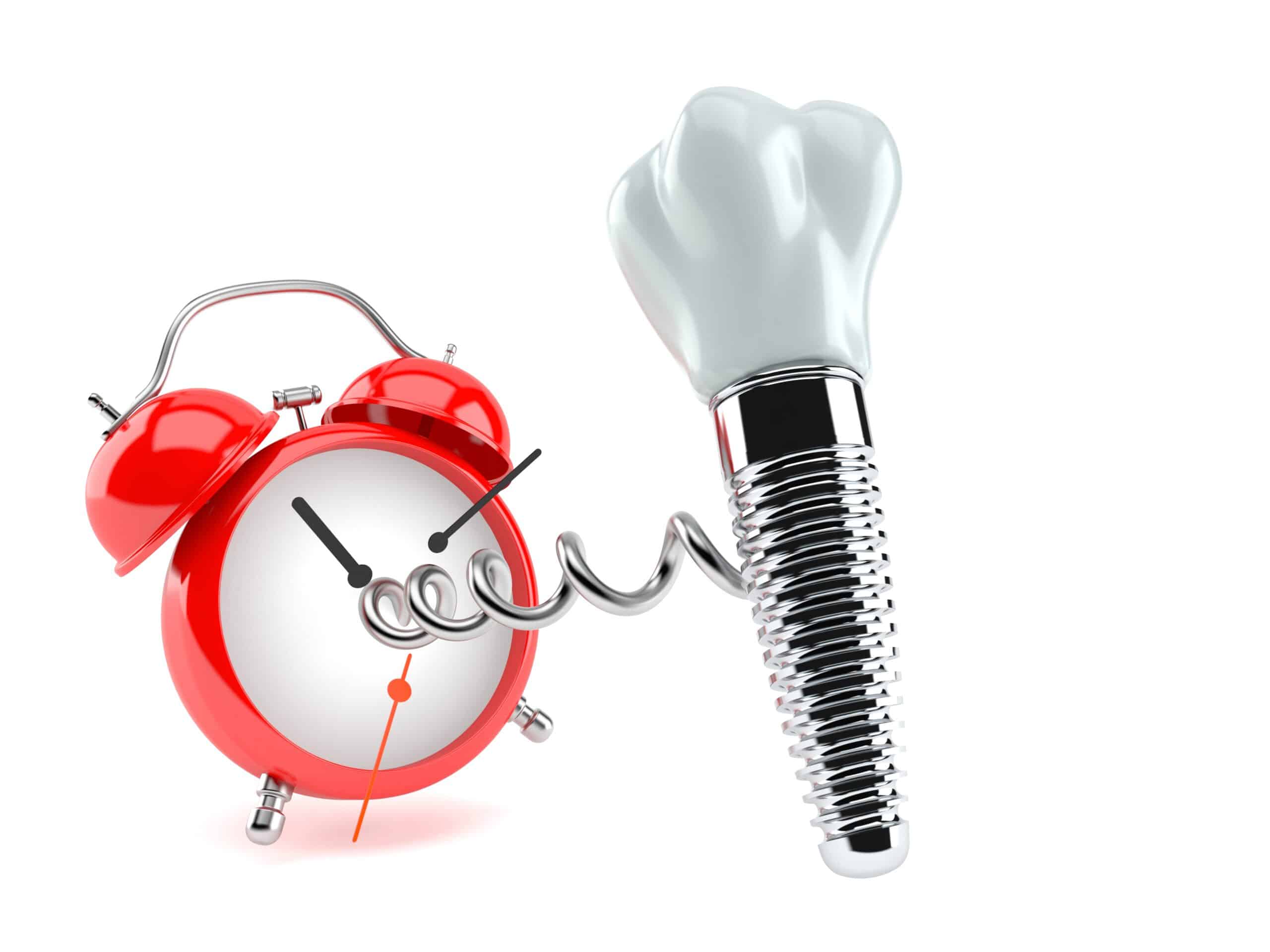Dental implants are currently the best solution to replace a lost tooth.
In recent years, the treatment has undergone a great evolution. For example, with the appearance of new techniques such as computer-guided surgery or the placement of implants by immediate loading.
Nevertheless, it is normal for the patient to ask many questions before the intervention. One of these frequent questions has to do with the duration of the dental implant in the mouth.
In this content, we will deal with this question in more depth in order to offer the clearest and most concise answer possible.
What does the duration of dental implants depend on?
Dental implants are a stable and long lasting solution.
However, the duration and effectiveness of implants in the mouth will depend largely on the patient’s case and lifestyle.
Broadly speaking, there are two factors that have a direct influence on the result of the duration of the implant:
Before the intervention itself, some factors are already determining the duration of the implant in your mouth.
The first of these is the choice of the professional who is going to operate on you. To guarantee a good result, the professional must be specialized in implants.
In turn, the implantologist you choose must develop his activity with professional ethics, in order to choose the highest quality implants for the intervention.
Implants are made of exceptionally strong materials such as titanium. In addition, they are designed to withstand masticatory forces with a wide margin of safety.
On that basis, you should know that there are several brands of dental implants.
In our dental clinic, to ensure long-term results, we work with Straumann and Avinent dental implant brands because they are considered to be of the highest quality.
If you find the best implantologist and good implants, you should know that most implant procedures are successful.
According to the Spanish Society of Periodontology and Osseointegration (SEPA), 98% of dental implants integrate satisfactorily into the bone.
Post-intervention factors
However, although it is extremely rare, it may happen that, with the passage of time, an implant may break or fracture.
You will be interested in ” What is the process for placing a dental implant?
Apart from this occasional mechanical accident, the problems suffered by implants are more attributable to the tissues surrounding them than to the implant itself.
In that sense, there are three cases that can lead to tissue loss in the area surrounding the implant: local conditions, systemic conditions and implant overload.
Let’s take a detailed look at each of them.
Local conditions: Bacteria accumulate around an implant just as they would around a natural tooth. If proper hygiene is not carried out, the gums will become inflamed and eventually lead to degradation of the bone that supports the tooth.
Systemic diseases: any disease that affects the repair of bone or other tissues is capable of causing wear and depletion of the bone tissue that supports the implant.
Overloading of the implant site: teeth participate in activities such as eating, swallowing and speaking under varying degrees of force. These forces are generally physiological in nature. Overloads (due to emotional stress, chewing gum, etc.) can cause microfractures at the junction between the bone and the implant and lead, over time, to resorption and disappearance of bone tissue.
In other words, if the implant has been optimally placed and good guidelines have been followed over the years, it is normal (with the exception of some specific cases) for implants to last for many years in the mouth.
Biological complications can also appear (such as mucositis and peri-implantitis) that make the duration of the implants shorter.
In order to detect early the development of this pathology, clinical (e.g. bleeding on probing) and radiological (characteristic bone loss) controls of the single implants are necessary.
Prophylaxis is performed by hygienists.
Enlarge image
PROFESSIONAL DENTAL HYGIENE
Dental implants: are they for life?
The truth is that dental implants are designed to be a definitive treatment. That is to say, they do not have an expiration date or an estimated half-life.
However, different published studies have established that 90% of the implants placed more than ten years ago maintain their functionality today.
The study “Dental treatment with single-implants. A 5-year study” detects an implant survival rate of 97.2% at 5 years and 95.2% at 10 years.
This means that 95% of all implants inserted last for a period of at least 5 years without any problem, and that only 5% of the implants have had to be removed before the 5-year limit.
In fact, the useful life of an implant can stretch up to 20 years. This is true for patients whose implants are optimally maintained.
Therefore, although implants can last for many years, this will depend, to a great extent, on you.
Take care of your implants
To maximize the duration of the implants it is essential to maintain good hygiene at home, not to smoke and to attend the check-ups prescribed by the implantologist.
Is there anything I can do to extend the duration of the dental implant?
After the operation, the implantologist will give the patient some guidelines so that the adaptation of the implant is a success and the postoperative period is as bearable as possible.
Once the adaptation phase is over, the duration of the implant in the mouth will depend on several factors that we are going to see below.
If you want your implants to last more than 10 years in the mouth, pay attention to the following indications:
Daily dental hygiene
The survival of implants over time has a lot to do with the patient’s daily dental hygiene routine.
And there is no excuse, since the hygiene guidelines for an implant are the same as for cleaning a natural tooth.
Therefore, patients who want to keep their implants for more years should have a good hygiene routine controlling bacterial plaque.
For this, it is essential to perform a good dental brushing (teeth and tongue) and use hygiene complements such as interproximal brushes, dental floss or irrigators, among others.
Healthy lifestyle
Another point to be taken into account is the patient’s lifestyle, which directly affects both the success of the implant placement and its survival over time.
Smoking is one of the main causes of failure of implant integration with the bone, since it slows down healing, generates inflammation and hinders osseointegration.
Smoking can not only cause the integration of your implant to fail, it will also cause the duration of the implant to be shorter.
But smoking is not the only problem that directly affects the duration of your implants. Stress, for example, is another common problem.
In fact, people who suffer from a chronic stress problem should go to the best specialist in dental implants and always opt for the best brands of implants. This is the only way to guarantee its success and durability.
Frequent dental check-ups
Many professionals assume that, in order to guarantee the long-term success of a dental implant, it is necessary a good placement of the implants and good hygiene on the part of the patient.
However, not all patients assume that it is essential to have a regular check-up with a dental hygienist.
Thus, the professional can periodically check and evaluate possible problems that interfere with the good “health” of the implant.
The main reason for the revisions is to control the optimal condition of the tissues surrounding the implant, both the gum and the bone, as well as to control that the force supported by the implant is correct.
In this sense, patients with implants should have a perio revision once every 6 months. Although, depending on the patient’s case, the dentist may schedule more frequent check-ups.
We are experts in Implants
At the DrAW Dental Clinic we have professional implantologists with more than 10 years of experience and with training in internationally prestigious masters.
In addition, we have state-of-the-art technology such as the 3D Cone Beam CT to obtain three-dimensional radiographic images and an intraoral scanner to meticulously plan computer-guided surgery cases, increasing the success rate of implant acceptance.
In our clinic we guarantee the proper functioning of the implants for a period of five years. This guarantee covers any unforeseen event or problem that may arise with them at no cost to the patient, provided that two simple conditions are met:
That the patient attends a check-up every six months.
That the patient undergoes the scheduled dental cleanings.
If you would like more information about the duration of your implants, do not hesitate to contact us at +52 664 590 8321.



